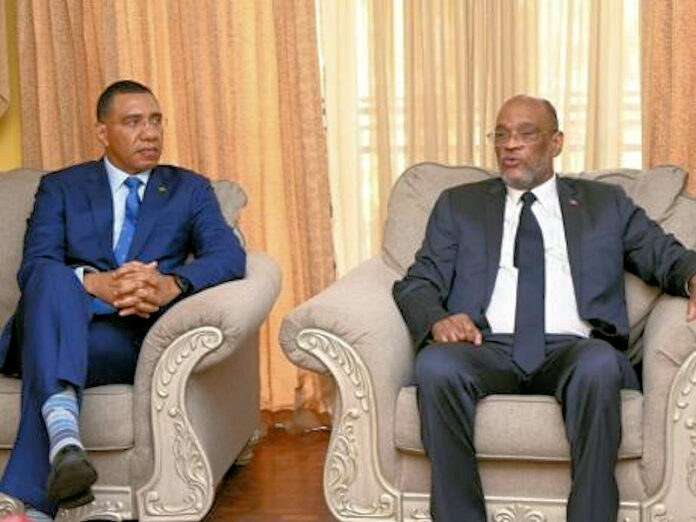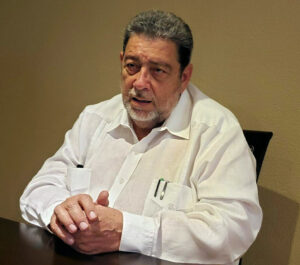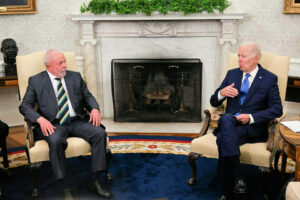
A recent poll by the Haitian daily Le Nouvelliste found that “69% of Haitians support intervention,” but only 1330 Haitians were polled, the AP revealed. Therefore, only 917 Haitians endorsed intervention in the poll. Haiti’s population is about 11.5 million.
It is also unclear how this poll was conducted, but it is clear that the sample size was tiny and not necessarily representative at all of Haiti’s entire population. Protests clearly show that many thousands of Haitians reject any foreign military intervention.
Anthropologist Jessica Hsu argues that there is a disconnect between some politically active “civil society groups,” who largely oppose intervention, and a large part of the general population, which sees foreign intervention as the only hope of providing some respite from violence.
“The majority of people who want an intervention do not have hope in any government improving their lives,” Hsu said. “Many people have told me that they do not trust the Haitian state, that it’s been absent, negligent and even exploitative.”

Hsu’s views may reflect a growing desperation resulting from the constant gang violence and deprivation Haitians face daily. Indeed, it has long been argued that the growing influence of violent gangs, mostly in Port-au-Prince, is fueled by elite interests. Oligarchs flood the nation’s capital with guns while backing gangs to carry out their political battles, settle scores, protect their property, and, as seems to be the case today, provoke another foreign intervention.
The Nouvelliste poll does reflect a general trend among Haiti’s fractured political class to find a consensus for some kind of foreign intervention. The two most prominent political coalitions do not condemn the options outlined by UN Secretary Antonio Guterres in his Oct. 8 letter to the Security Council. CELAC’s recent Buenos Aires declaration recommended members “study” the letter, in which Guterres describes two options: an advisory “multinational police task force” or a combat-ready “multinational special force.”
Recent statements by leaders of the two main political factions indicate a consensus on a path forward. On Dec. 23, 2022, Henry shared his hope for a “multinational support force for the PNH” to arrive in Haiti in 2023. This is a change from Ariel Henry’s original request for “a specialized armed force.”
The Montana Accord is often presented as the alternative to Henry and PHTK rule. When the Montana Accord was signed in August 2021, its coalition seemed to have broad support across Haiti, claiming support from over 600 political and “civil society” groups. Whatever support the coalition once enjoyed, it has clearly narrowed considerably. The Montana group does, however, continue to find enthusiastic supporters in Washington, including many U.S. diplomats and think-tanks.
In an article for Just Security in September 2022, Jacques Ted Saint Dic – a Montana spokesperson – wrote “the United States should use creative and aggressive tactics to intercept criminal activity in Haiti.” Clarifying that the United-States has a “powerful and important role” to play “in helping get democracy back on track in Haiti.” Saint Dic followed up a month later, explaining that “the PNH needs technical support” from Washington.
During a Dec. 29 press conference, Fritz Alphonse Jean, Montana’s designated interim President, stated that Montana supports a change in leadership to facilitate a breaking of ties between individuals in the political class so the PNH can “absorb an adequate international assistance within the framework of cooperation that is defined and established by the new leadership” – namely, himself.
The two factions now evidently agree on the nature of the impending foreign intervention in Haiti. It must come in the form of “assistance for the PNH.” It is understood that the terms “military” and “intervention” should not be uttered.
impending foreign intervention must come in the form of “assistance for the PNH.” It is understood that the terms “military” and “intervention” should not be uttered.
Other political parties in Haiti are on board with this framing too.
Fanmi Lavalas threw their support behind international support for the PNH. The caveat being that this support must be a “Haitian initiative.” Lavalas spokesperson Jodson Durogène made these comments in an interview with Alterpresse after meeting with CARICOM’s delegation to Haiti, led by Jamaican President Andrew Holness on Feb. 27. This delegation follows the recent CARICOM biannual leaders meeting held Feb. 15-17, 2023, where military intervention was rejected.
Meanwhile, Pitit Desalin leader Moïse Jean Charles, who recently announced a new coalition of 20 political parties and civil society groups, stated that Haiti needs “an army to control the territory” in addition to “a professional police to guarantee the safety of the population.” He made these statements upon arriving in Russia with the intent of “speaking to young people.”
Henry’s “December 21 Accord” Sets Back Montana
Henry and the Montana leadership have been vying for Washington’s approval since the Montana Accord was announced. While the enthusiastic support for Montana from many in Washington seemed to indicate that a transition away from Henry was imminent, his new Dec. 21, 2022 accord called the”Consensus National for an Inclusive Transition and Transparent Elections,” seems to have changed the calculus, or at least won him some time.
Both CELAC and CARICOM have “welcomed” Henry’s Dec. 21 Accord while the Organization of American States (OAS) calls it an “important step forward.”
CELAC and CARICOM both received Henry as Haiti’s legitimate leader at their meetings in January and February respectively. CARICOM met in Haiti with civil society groups and political parties, including Montana Accord leadership, a week later. Holness led the delegation that spent only one day in Haiti listening to the concerns of these groups.
The Dec. 21 Accord does not represent a real broadening of consensus. Henry’s own party, the PHTK, does not support it, along with other parties like Lavalas, its offshoot, the Pitit Desalin of former Sen. Moïse Jean-Charles, UNIR, GREH, MOPOD, LAPEH, Kontrapèpla, and the OPL.
On Jan. 30, Montana’s designated Prime Minister, Steven Benoît, resigned. Montana spokesperson Jacques Ted Saint Dic called Benoît’s resignation a “great sacrifice” that will “open up negotiation” so all parties can participate.
The move seems to have failed to gain Washington’s favor, and Montana spokesperson Jacques Ted Saint Dic seems to realize this. During a recent interview on Magik 9, Saint Dic did a complete reversal on his earlier claims that the U.S. has a “powerful and important role” to play “in helping get democracy back on track in Haiti.” In the interview, he said Montana is “an opposition force to international power,” saying “the Americans hold the real power in Haiti ” and that “Montana intends to seize power through negotiation, through social and citizen mobilization.”
Is there any hope for solidarity with Haiti from CELAC and CARICOM?
The recent change in leadership at CELAC may work in favor of Haitians. Argentina’s President Fernandez was replaced by Ralph Gonsalves, Prime Minister of Saint Vincent and the Grenadines. Gonsalves has been adamant that “any intervention in Haiti must have the buy-in of Haitian stakeholders.” He also acknowledges that “that many Haitians do not recognize the present Haitian Government of Prime Minister Dr Ariel Henry.”
Gonsalves is reluctant to support any kind of intervention while Henry is in power. Commenting in December 2022 on the possibility of a CARICOM-led intervention he said “fundamentally, any CARICOM Mission in Haiti must first be predicated upon a political/governance solution crafted by the Haitian stakeholders consequent upon an inclusive dialogue between them.”
“Above all” Gonsalves continued, “Haitians must devise their solutions and lead the process themselves – representatives of all the Haitian people, not merely a government which lacks legitimacy and effectiveness.”
Gonsalves also hopes “to see the end of colonialism in our Caribbean.”
Gonsalves also hopes “to see the end of colonialism in our Caribbean.” His anti-colonial views are centered on a desire to see Caribbean nations still under the yolk of the British Commonwealth to embrace Republican-style government. Gonsalves said he wants to see that “all or most of the independent CARICOM countries will move from a monarchical to a republican system.”
Writing for Pressenza, Javier Tolcachier, a researcher from the World Centre of Humanist Studies, hopes Gonsalves’ focus on decolonization will facilitate a sense of urgency for “safeguarding the self-determination of the Haitian people, currently under attack by foreign intervention and Henry’s de facto government.” Tolcachier also sees Gonsalves as a potential advocate for Haitian sovereignty and democracy in Haiti.
Gonsalves first diplomatic visit as CELAC’s President is to meet with Venezuelan President Nicholas Maduro. Venezuela and Cuba have traditionally supported Haitian sovereignty and democracy. Maduro’s statements at the CELAC Summit against interventionism will likely be amplified under Gonsalves’ leadership, along with the pleas of Haitians to the region for respect for their sovereignty and show solidarity with them.
In an open letter to CARICOM leaders, BAI director and human rights lawyer Mario Joseph wrote that Haitians “would be deeply saddened to see our CARICOM brothers and sisters come here to arbitrarily shoot, massacre and arrest protesters and support a repressive government at the behest of powerful countries that gained their status through the Atlantic slave trade.”
“We want CARICOM to insist once again that the international community stop supporting an unconstitutional and imposed regime and allow Haitians to find a democratic and lasting solution to our political crisis,” he continued.
Joseph said Haitians “do not want our CARICOM brothers and sisters to come with arms to help powerful countries impose a repressive regime on us. We want our sisters and brothers to come in solidarity, with respect and democratic principles.”

The risk in allowing Washington and the CORE group to “support the PNH” was apparent when former U.S. Ambassador to Haiti Pamela White, in the Dec.2 Washington Post, explained her plan for the Biden administration to send “2,000 armed law enforcers” to Haiti. To avoid the optics of thousands of armed U.S. soldiers landing in Haiti, White proposed that Washington “send in a couple of hundred at a time, over six months, with little fanfare.”
A small brigade of foreign “law enforcers” or “advisors” could grow exponentially to if they clash with Haitians.
The number of PNH officers has dropped below 10,000, with many more trying to emigrate out of Haiti. To further complicate the situation, one report estimated that over half of current PNH officers collaborate with gangs or vigilance brigades. Haitian police are also chronically underpaid, leading many to work for private security companies. In 2012, an estimated 12,000 Haitians worked form private security firms for wealthy Haitians who can afford to foot the bill. Since then, the number has grown.
Were a “multinational force” organized under the banner of CARICOM, the OAS, or a “coalition of the willing,” it remains unclear how that “support” would be staffed. The small number of Caribbean and Latin American countries who endorse a “multinational force” to “support the PNH” do not appear to have the resources or troops to accomplish the mission.
Who would lead the intervention?
This “multinational force” has no nation willing to lead it, as Brazil led the MINUSTAH. Holness’ leadership of the Feb. 27 CARICOM delegation to Haiti suggests that Jamaica might accept the role.
Washington understands the importance of having a Latin American or Caribbean front on an intervention in Haiti. In a recent interview with Devex, a U.S. State Department spokesperson said that Washington has not given up on the idea of an international force for Haiti and that it continues to urge countries to participate: “Once a lead nation is identified, we expect to work with them and Ecuador, our new UN Security Council partner on Haiti issues, to draft a UN Security Council resolution authorizing this mission.” Nonetheless, a Security Council veto from Russia is possible.
While a few CARICOM leaders have independently endorsed a military intervention in Haiti, Lula’s position might sway many others.
During Lula’s recent trip to Washington, DC, his discussion with President Joe Biden of “shared values” is ominous. Lula has, however, refused to support the escalation of Washington’s proxy war in Ukraine and called for peace, thus aligning with his BRICS allies. If Lula leans towards intervention in Haiti, Gonsalves’ position may work to counterbalance Brazil’s influence on the region’s leaders.
Travis Ross is a teacher based in Montreal, Québec. He is also the co-editor of the Canada-Haiti Information Project at canada-haiti.ca. Travis has written for Haiti Liberté, Black Agenda Report, TruthOut, and Rabble.ca. He can be reached on Twitter.










[…] is in line with Ariel Henry and Montana’s leadership, both of whom publicly endorse the “support the PNH” intervention framework. They simply disagree on who ought to be in power […]